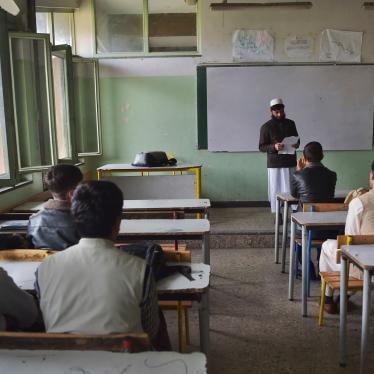(New York) – Alleged militants attacked and burned down at least 12 schools in Diamer district of Pakistan’s Gilgit-Baltistan region early on August 3, 2018, Human Rights Watch said today. At least half were girls’ schools. No group has claimed responsibility for the attacks.
The Pakistani government should take urgent measures to make schools safer, and fairly prosecute those responsible for attacks against students, teachers, and schools.
“The devastating attacks on schools in Diamer highlight the dangers that many students and teachers in Pakistan face on a regular basis,” said Bede Sheppard, deputy children’s rights director at Human Rights Watch. “The government should promptly investigate and prosecute these attacks and ensure that children have a safe place to attend school.”
Pakistan faces significant education challenges, with an estimated 25 million children out of school. Militant violence has disrupted the education of hundreds of thousands of children, particularly girls. Militant Islamist groups, including the Taliban, Lashkar-e-Jhangvi, and their affiliates, attack schools and universities to foster intolerance and exclusion, target symbols of the government, and particularly to drive girls out of school.
Militants have previously targeted girls’ schools in Diamer district. In February 2004, attackers destroyed nine schools, eight of them for girls. Explosives hit two girls’ schools in December 2011.
The nongovernmental awareness campaign Alif Ailaan reported that Diamer is the lowest-ranked district in terms of quality of education in the Gilgit-Baltistan region, and is among the 10 lowest ranked in the country. Only 3,479 girls are among the 16,800 students enrolled in government schools in the district, which has 88 government schools for girls and 156 for boys.
After the Taliban took over large parts of the Swat Valley in Khyber Pakhtunkhwa province in 2007, it began a violent campaign against education for girls. Over 900 girls’ schools were forced to close and over 120,000 girls stopped attending school. About 8,000 female teachers were driven out of work. For many girls, the loss was permanent, and they were not able to return to school even after the army displaced the Taliban.
The Pakistani government says it does not collect specific data on attacks on schools and universities, or on deaths and injuries from such attacks. However, according to the Global Terrorism Database, there were 867 attacks on educational institutions in Pakistan from 2007 to 2015, resulting in 392 fatalities and 724 injuries. The Global Coalition to Protect Education from Attack recorded at least 203 attacks on schools in Pakistan between 2013 and 2017.
The government’s failure to keep consistent and transparent national data about such attacks raises serious concerns about its ability to track repairs of damaged schools, identify trends that could help create measures to protect schools, or investigate and prosecute the people responsible, Human Rights Watch said.
The attacks on Malala Yousafzai, who later became a Nobel peace Prize laureate, on October 9, 2012, and on the Army Public School in Peshawar on December 16, 2014, which killed at least 145 people, mostly students, directed international spotlight on the threat to education in Pakistan.
In some areas, government forces have used educational institutions, including both schools and college housing, as temporary or permanent barracks or military bases. When educational facilities are used for military purposes, it places them at increased risk of attack. The government should issue clear and public orders to Pakistan security forces to curtail the military use of schools.
Pakistan should develop a comprehensive policy for protecting students – especially girls – as well as teachers, schools, and universities from attack and military use, and involve all concerned ministry staff at central and local levels in carrying out this strategy, Human Rights Watch said.
Securing schools has been largely left to the provincial governments, whose efforts have been sporadic, varying across provinces with little attention to protecting girls’ education. In most cases, responsibility for enhancing and maintaining security has fallen to hard-pressed school authorities.
Pakistan’s federal government should cooperate with provincial and regional authorities to create a rapid response system for attacks on schools. Schools should quickly be repaired or rebuilt, with destroyed educational material replaced, so that children can return to school as soon as possible. Schools should operate in alternate sites during reconstruction, and students should have mental health support as needed.
Pakistan should join the 80 countries that have endorsed the Safe Schools Declaration, a non-binding political agreement opened for state support at an international conference in Oslo, Norway, in May 2015. Countries that endorse the Safe Schools Declaration pledge to restore access to education when schools are attacked and undertake measures to make it less likely that students, teachers, and schools will be attacked. They agree to deter such attacks by promising to investigate and prosecute crimes involving schools, and to minimize the use of schools for military purposes so they do not become targets for attack.
“The Pakistani government should do all it can to deter future attacks on education, beginning with improving school security and providing the public with reliable information on threats,” Sheppard said. “Attacks on education not only harm the students and families directly affected, but also have an incalculable long-term negative effect on Pakistani society.”










